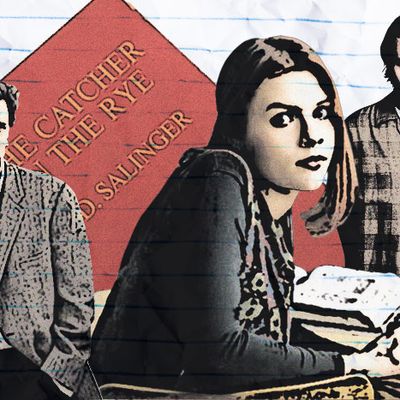
The first time I read The Catcher in the Rye, I was in seventh grade. My copy had the stark red cover, not the scrawly carousel horse from the first edition — and when I say “my copy,” I mean the copy my sister had from her ninth grade English class. It felt like my copy, though, because like zillions of other people, I read the book and thought, Man, that guy really gets it. Not J.D. Salinger, although I guess he did, too, but Holden Caulfield. Now, there was a guy with some good ideas: He just leaves school and farts around! Everyone is pretty terrible except him! (And Phoebe.) Other people are total phonies, mostly, you know? This was my kind of urbane melancholy.
I read The Catcher in the Rye again two years later when it was my turn to take Miss McGinn’s ninth grade English class, and I’ve read it every five or six years since. Holden seems radically different to me now — of course. When I first read the book, I was younger than the character, and he seemed mature and kind of glamorous, what with all the walking around Manhattan alone, the casual drinking of alcohol, and the making of plans. I’m more than twice his age now, and glamorous and mature are probably the last words I’d use to describe him.
The same thing happened with Angela Chase on My So-Called Life. The first time I watched it, I was younger than Angela, and she seemed so damn cool to me, with her plaid dresses and don’t-give-a-shit backpack. And man, was Rayanne ever free spirited and exciting — just the kind of friend I’d probably have a few years hence. Again, rewatching it even just a few years later, the experience was completely different. I don’t think Angela is super cool and I don’t dream of having a friend like Rayanne. I think they’re incredibly accurate depictions of the panic and self-recrimination that come with adolescence, the lack of impulse control and the sensation of everything being a Big Deal. This doesn’t make me love the show any less, and, in fact, knowing how it looks from both sides of the teen divide makes me respect it even more.
This isn’t just developing more mature taste or gaining perspective, though. I loved ER from day one and love it now, but my feelings about it don’t reflect any personal transformations: Being older (and wiser, I hope) doesn’t make me root more or less for Carter. It does, however, make me far more sympathetic to Ben Stiller’s character in Reality Bites — who seemed like a greedy pariah when I first saw the movie and now seems like the only person with his shit even a little bit together. When someone puts your video babbling on MTV, you’re supposed to say thank you. Again, I still enjoy the hell out of that movie, but I no longer see it as a fantasy; I see it as a cautionary tale.
Coming-of-age stories aren’t just about characters coming of age. They’re sometimes reflections of how we ourselves came of age — or didn’t. The first time I saw Kicking and Screaming (the Noah Baumbach one, not the Will Ferrell one), I was 22. It was like looking in a ferociously unflattering mirror — so unflattering, in fact, that at the time I didn’t recognize my own reflection. Man, what a bunch of losers, I thought then. I watched Kicking and Screaming again this summer in the wake of a Frances Ha emotional crisis and, rather than scoff, I was struck by how frightened all the characters were. Just like I had been. Scared enough to be badly behaved, to be cruel sometimes, and irresponsible, scared enough to be convinced that fun and happiness were limited resources and the well was dangerously close to dry. I saw myself so, so clearly in the characters this time around. I genuinely did go to Prague after college graduation! That is how closely the film reflects my life.
For ubiquity alone (at least for now), Holden Caulfield’s probably the prime example of this kind of emotional doppler effect. He sounds like one thing as you move toward him and like something completely different as you move past, even though he’s just standing there, in that red-covered book, making the same sound the whole time. His pitch hasn’t changed, and I can still hear him loud and clear — even as I move farther and farther away.

